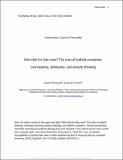Who falls for fake news? The roles of bullshit receptivity, overclaiming, familiarity, and analytic thinking
Author(s)
Pennycook, Gordon; Rand, David G
DownloadAccepted version (2.066Mb)
Open Access Policy
Open Access Policy
Creative Commons Attribution-Noncommercial-Share Alike
Terms of use
Metadata
Show full item recordAbstract
© 2019 Wiley Periodicals, Inc. Objective: Fake news represents a particularly egregious and direct avenue by which inaccurate beliefs have been propagated via social media. We investigate the psychological profile of individuals who fall prey to fake news. Method: We recruited 1,606 participants from Amazon’s Mechanical Turk for three online surveys. Results: The tendency to ascribe profundity to randomly generated sentences—pseudo-profound bullshit receptivity—correlates positively with perceptions of fake news accuracy, and negatively with the ability to differentiate between fake and real news (media truth discernment). Relatedly, individuals who overclaim their level of knowledge also judge fake news to be more accurate. We also extend previous research indicating that analytic thinking correlates negatively with perceived accuracy by showing that this relationship is not moderated by the presence/absence of the headline’s source (which has no effect on accuracy), or by familiarity with the headlines (which correlates positively with perceived accuracy of fake and real news). Conclusion: Our results suggest that belief in fake news may be driven, to some extent, by a general tendency to be overly accepting of weak claims. This tendency, which we refer to as reflexive open-mindedness, may be partly responsible for the prevalence of epistemically suspect beliefs writ large.
Date issued
2020Department
Sloan School of Management; Massachusetts Institute of Technology. Department of Brain and Cognitive SciencesJournal
Journal of Personality
Publisher
Wiley